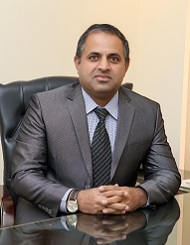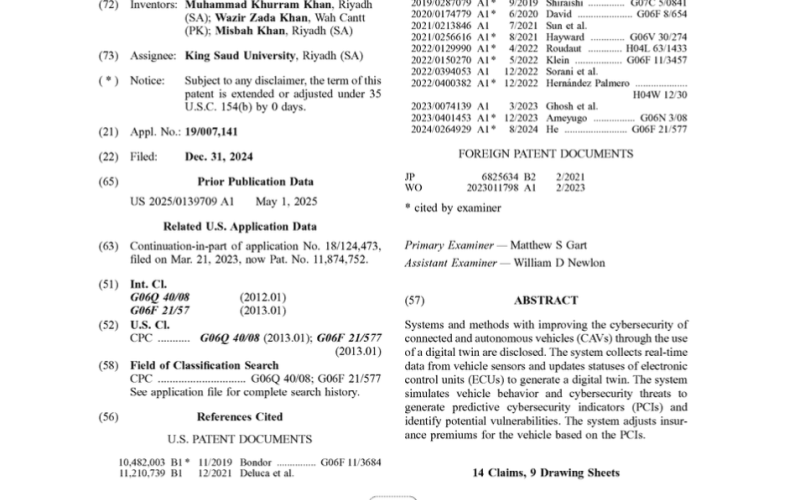King Saud University Awarded U.S. Patent for Innovative Cybersecurity System for Connected and Autonomous Vehicles
In a major advancement toward the future of secure smart mobility, King Saud University (KSU) has been granted a United States patent (US 12,423,759 B2) for an innovative invention titled: “System and Method for Cybersecurity Risk Monitoring and Evaluation in Connected and Autonomous Vehicles.”
Developed by Prof. Muhammad Khurram Khan, along with his co-inventors Dr. Wazir Khan and Misbah Khan, this patent significantly strengthens the university’s growing intellectual property portfolio in the field of automotive and vehicular cybersecurity. The groundbreaking research behind this patent was conducted at the Center of Excellence in Information Assurance (CoEIA), a leading institution for cybersecurity research and innovation in the Kingdom of Saudi Arabia.

As global transportation systems transition toward connected and autonomous vehicles (CAVs), the need to secure these intelligent systems against cyber threats becomes increasingly critical. This patented invention addresses that challenge by introducing a comprehensive and proactive cybersecurity framework tailored specifically for smart mobility. The system leverages a Digital Twin-based approach to monitor, assess, and predict cybersecurity risks in real time, enhancing both safety and resilience.


The invention features a suite of integrated components, beginning with a monitoring module that collects real-time data from the vehicle’s ECUs, driving behavior, environment, and user inputs. This data is processed by an ECU update status module, which checks for vulnerabilities by comparing the information with manufacturer-issued updates. A Cybersecurity Risk Score (CAV-CRS) is then computed to reflect the vehicle’s current security health. A digital twin simulation module creates a virtual replica of the vehicle, simulating various threat scenarios to generate Predictive Cybersecurity Indicators (PCI) that forecast future risks. Finally, an insurance premium calculation module uses these risk metrics to dynamically adjust the vehicle’s insurance premium, incentivizing strong cybersecurity practices among manufacturers and users.
This invention not only helps safeguard next-generation vehicles but also introduces a novel method for insurance companies to calculate premiums based on real-time cybersecurity data and predicted risks. It offers a competitive edge to automotive manufacturers looking to build safer, smarter, and more trustworthy vehicles. The co-inventors are currently exploring licensing opportunities and strategic partnerships to bring this innovation to the global automotive market.
This development aligns closely with Saudi Vision 2030, which prioritizes technological innovation, digital transformation, and economic diversification. As Saudi Arabia makes bold strides in building its domestic automotive industry and smart mobility infrastructure, innovations like this highlight the Kingdom’s growing leadership in cutting-edge research and applied technology. King Saud University remains a driving force in advancing national goals through impactful research that bridges academia and industry.

